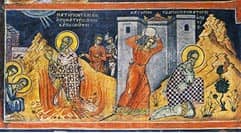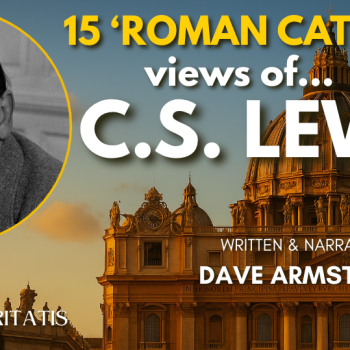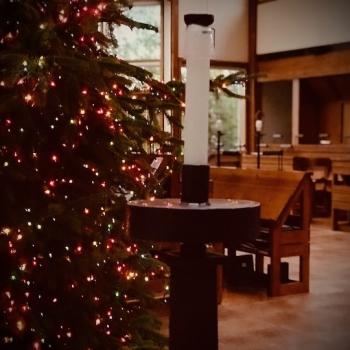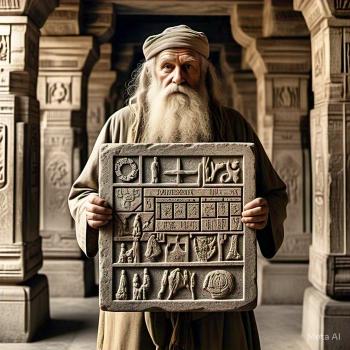 Polycarp is not a fish. He was an amazing Greek bishop from Smyrna.
Polycarp is not a fish. He was an amazing Greek bishop from Smyrna.
Okay, so maybe you knew that already.
Still, Polycarp is one of the heroes of the earliest Church and everyone should know his name. Memorialized by the Church for his readiness to die for the faith, in doing so, Polycarp witnessed to what it means to live as a loyal disciple. The liturgical calendar honors his martyrdom on February 23rd for good reason.
Polycarp became a young first-century believer in Jesus Christ, under the tutelage of St. John the Apostle when he ministered in Ephesus. Years later, a very elderly John would ordain Polycarp Bishop of Smyrna at about age 35. He was a young bishop leading a young church south of Ephesus in Smyrna, now the coastal city of Izmir, Turkey.
For fifty years, Polycarp led his church. Along the way he was a friend to Ignatius of Antioch, another bishop and martyr who perished in Rome. He taught a young Irenaeus, better known as the future Bishop of Lyons, and later, a Father of the Church and saint. For us, Polycarp serves as a link between the nascent church of the apostolic age, and the emerging spread of Christianity into the 2nd and 3rd centuries despite the religious persecution of the day.
 Polycarp's heroic death is recounted in a famous letter written by an eyewitness. Preserved and revered as one of the great martyrologies of the Church, The Martyrdom of Polycarpis the earliest one we have, outside of Stephen's martyrdom recorded inActs of the Apostles,chapter 7.
Polycarp's heroic death is recounted in a famous letter written by an eyewitness. Preserved and revered as one of the great martyrologies of the Church, The Martyrdom of Polycarpis the earliest one we have, outside of Stephen's martyrdom recorded inActs of the Apostles,chapter 7.
Written in the popular epistle style of exhortation and encouragement—think of St. Paul's many letters—The Martyrdom of Polycarp is a 3,700-word treatise on how to die with dignity, without compromising one's faith, even when under fire, or literally, on fire! A Christian named Marcion dictated the compelling story to a scribe named Evaristus. The letter then circulated to honor Polycarp as it heartened fellow Christians undergoing persecution.
Around the year 155, Polycarp, then in his 80s, knew his persecutors were coming for him. He was prepared in prayer via a dream that envisioned his being burned at the stake. But despite his advanced age, Polycarp didn't go quietly. No, the Bishop of Smyrna not only predicted his death, but along the way he made sure his executioners knew their own fate; his martyrdom would be a short suffering compared to the torment reserved in the afterlife for those opposed to God and his ways.
At his arrest, Polycarp generously served food and drink to the police who had come for him. He respectfully asked them for the indulgence of an hour of uninterrupted prayer before departing. They complied, and Polycarp rose and prayed in their midst—for two hours!
. . . and on their consenting, he stood up and prayed, being so full of the grace of God, that for two hours he could not hold his peace, and those that heard were amazed, and many repented that they had come against such a venerable old man. But when at length he brought his prayer to an end, after remembering all who at any time had come in his way, small and great, high and low, and all the universal Church throughout the world, the hour of departure being come, they seated him on a donkey and brought him into the city, it being a high Sabbath. (Martyrdom of Polycarp, 7:3-8:1)
Roman officials commonly taunted their Christian captives by calling them atheists, for they did not worship the Roman gods. Within that context, there is an ironic moment prior to his execution whereby Polycarp deadpans the taunt, and with a wave of his hand inverts it and implicates the atheists gathered in the stadium to watch the Christians die.
But as Polycarp entered into the stadium, a voice came to him from heaven; "Be strong, Polycarp, and [be a] man." And no one saw the speaker, but those of our people who were present heard the voice . . .
When then [Polycarp] was brought before him, the proconsul asked whether he were the man. And on his confessing that he was, he tried to persuade him to a denial saying, "Have respect to your age . . . Swear by the genius of Caesar; repent and say, 'Away with the atheists.'" Then Polycarp with solemn countenance looked upon the whole multitude of lawless heathen that were in the stadium, and waved his hand to them; and groaning and looking up to heaven he said, "Away with the atheists."





